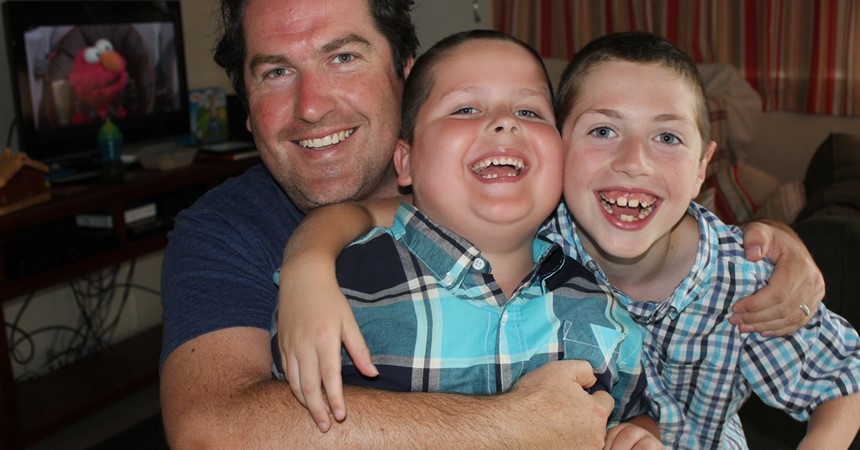It was meant as an initial ice-breaker to the training day; however, the question remained with me all day. As I considered my response, our journey of having one of our two sons, Samuel, severely impaired by Autism and its many co-occurring diagnoses filled my mind.
As a speech pathologist, I had assessed and treated children with Autism for nearly a decade before Samuel was born and this presented as a double-edged sword as I recognised very early in Samuel’s life, the signs and characteristics of Autism. The triad of impairment – communication disorder, restricted and repetitive behaviour and social skill impairment – became more recognisable as Samuel’s initial words began to disappear, his insistence on spinning saucepan lids and lining up Thomas the Tank engine trains turned from occasional occurrences to obsessions and his beautiful smile became a distant memory.
The grief of such a diagnosis is overwhelming. In dealing with the initial shock, denial is often followed by sadness, anger, disappointment, fear and most of all “the unknown”. Families often travel through the cycle of grieving more than once when living with a child with a disability, as missed milestones lead to the returning feelings of sadness and loss. The year that Samuel should have started Kindergarten at his brother’s school reignited feelings of grief, particularly for Samuel’s brother, Xavier, as he watched his other classmates enjoy their siblings starting school with them.
Samuel’s additional co-occurring difficulties became evident very early in our journey. There were multiple sensory issues ranging between over- and under-sensitivity to noise, taste, touch, movement and sight on a daily basis. Samuel’s diet became restricted to the point of only eating beige crunchy biscuits. His night-time sleep patterns became haywire – going to sleep at 2am and only sleeping for three or four hours before he was ready to start his next day.
Normal daily tasks of shopping, attending a park, public pool or a restaurant became increasingly challenging. Sensory meltdowns in supermarkets led to glares of disapproval being shot our way with often the addition of a critique being made of my parenting skills. Public judgement from general community ignorance occurs constantly for people with disabilities as they still remain a marginalised group within society today. This further impacts upon the social isolation, increasing anxiety for both the child and parent, and leading to families avoiding community outings all together. Unfortunately, people remain mostly unaware of how brave the family of a child with a disability has to be to enter into the community. They have to be ready to deflect the sideways glances and go armed with multiple exit plans. A lot of preparation is required to choose a place, time of day and day of the week to give the best chance of success. Families can easily become prisoners within their own homes trying to maintain some degree of sanity, some recollection of a former life, whilst still trying to get the groceries done!
As parents living with a child with Autism, we are required to take on the role of carer, protector, advocate, therapist, researcher and medic, 24 hours a day. It can be hard to 'switch off' from the many challenges as well as still trying to fulfil workplace responsibilities and roles as a husband or wife and parent to other children within the family. Unfortunately, isolation and losing friendships can often become the “reward’ of giving 100% to the child with special needs.
Whilst living with the impact of all the characteristics of Autism and struggling with the effects of long-term sleep deprivation – an ever constant feeling of having jet-lag − my Catholic faith has been paramount in getting me through the years since diagnosis. In the first year I can recall praying the prayer that Jesus made in the Garden of Gethsemane – "My Father, if it is possible, let this cup pass me by. Nevertheless, let it be as you, not I, would have it." Initially I prayed that by some means of divine intervention “this cup” could somehow be taken away from me. However, as I continued praying, I was strengthened by my faith, allowing acceptance of my challenging life-long role to love, care for and nurture Samuel. My faith supported me to get up each day to continue dealing with my “cross” in life to the best of my ability.
As Samuel grew older, hope came in the form of early intervention and the possibility to give our son a real chance of improving his functional skills and long-term potential. We utilised all our time and financial resources to make the most of the vital years prior to schooling to make a connection with Samuel, to help him see the value in communicating with others and help him move from being locked in his own world to join, cope with and enjoy being part of our family. With the arrival of the National Disability Insurance Scheme (NDIS), we are now more empowered than ever to assist Samuel obtain as much independence as possible in the longer term by being granted choice and control over supports and therapies being incorporated into his current weekly routine.
In the acceptance of my son’s diagnosis − long after that training day I attended many years ago − I have found the positives in living with a child with Autism. The restriction of our basic freedom to do things as a family leads to a heightened appreciation when we can go out together. Such events then become treasured and truly valued as ‘diamonds in the rough’. Along with huge lifelong sacrifices and challenges, and the ongoing grief experienced living with a child with Autism, also comes the opportunity to be strengthened by faith and appreciate the moments in life that might not have otherwise been valued, or even passed by without notice.






















































































